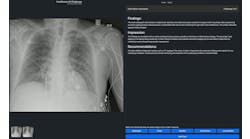Q&A: UNC Health CIO Brent Lamm Enthusiastic About Pilot of DAX Copilot
Pilot projects involving Nuance Dragon Ambient eXperience (DAX) Copilot are the result of a partnership between Microsoft, Nuance, and Epic to accelerate conversational, ambient, and generative AI solutions for EHR users and automate the creation of clinical documentation during patient exams. Brent Lamm, senior vice president and chief information officer of UNC Health in North Carolina, recently spoke with Healthcare Innovation about the pilot efforts under way there.
Healthcare Innovation: Could you talk about why UNC Health wanted to be one of the pioneers in using this technology?
Lamm: We’ve been doing several other things with Microsoft and Epic, so this has been a continuation of that journey. When they reached out to us and asked us if we would be willing to participate in this small initial pilot with a couple of other academic health systems, we jumped at the chance because we knew this would be a real opportunity for us. The Microsoft/Nuance technology tightly integrated with Epic was very attractive to us.
The genesis of this work really started about two years ago. Coming out of the pandemic, our providers were seeing a 650 percent increase in the number of patient messages they were getting through our MyChart portal. Now, obviously, this particular technology doesn't address that part, but that really elevated for us in a quantified way the administrative challenge and burden that was driving our providers to feel burned out. We've been pulling a lot of different levers to try to help address that. But this one, I think, is really the most exciting and special because not only is this really trying to help our physicians, but more importantly our physicians through this pilot are saying the patients love this so much better. Because with this ambient listening technology, what it does is it allows that physician to forget the computer for that conversation with the patient. They can look them in the eye. They can be fully attentive, and they can really have that human-to-human connection during that clinical visit and verbalize what they need the computer to do.
HCI: Does that require some training so that the clinician say things verbally that before they might have entered into the computer as a clinical note?
Lamm: Absolutely. We give them upfront training before they start the pilot. Anecdotally, what we hear is that patients actually walk away and feel like, ‘Gosh, that was a really good experience with my physician because I got to hear what's the physician thinking.’ The physician is verbalizing more of that interaction, and the patient feels like, okay, I know what they're doing now or I get it that makes sense. Or they have the ability to ask questions that they didn't know to ask before.
HCI: Have you piloted this across specialties or just in primary care? And do you have plans for how it's going to roll out across the whole UNC Health System?
Lamm: We have piloted this now with internal medicine, family medicine, orthopedics, pediatrics, cardiology, oncology, and gastroenterology. So we've got a really good cross-section using the DAX Copilot. We're working now on trying to finalize our pilot, to be able to collect the necessary data that we need to then drive forward internal processes and contracting with Microsoft. We’re very bullish about rolling this out. We just need to make sure we do that in a thoughtful way.
At the end of the day, what we need for this to do is really three things: it needs to enhance that patient experience. It needs to remove that administrative burden from the physician, and we need to do all that in a way that did not does not add cost to healthcare delivery. I believe we're going to see that.
HCI: Is there a timeframe for when the piloting will show that, and then the bigger rollout will happen?
Lamm: I hope that we are within a couple of months of being able to do a much broader penetration of this.
HCI: Does the ambient part of this require any kind of change to the the room where they meet, like adding microphones to better pick up the conversation?
Lamm: No. The beauty of this is it's all on the iPhone. It's an app on the smartphone. Our providers will ask the patient verbal consent to use this. They’re working in their native Epic Apple mobile app, which is Haiku. This is the beauty of the Microsoft/Epic work here to integrate this seamlessly. The provider is not having to go into a different app. They're not having to go into a different ecosystem, or use different microphones. It’s using that smartphone that's sitting between the physician and the patient.
HCI: Getting back to the overloaded messaging inboxes you mentioned earlier, is that something you are addressing in a different way?
Lamm: Yes, we’ve actually been in another pilot effort with Microsoft and Epic that started last summer, where we're part of a group of academic health systems across the country that are piloting the auto-draft via generative AI of a response back to the patient. That's a separate effort, but still using the same underlying Microsoft and Epic technologies, which is exciting for us. The provider can see that message from the patient, and have a draft response written. The physician is still in full control. That's one of our guiding principles. But you know, the cognitive burden that is removed from having to actually create the response, instead of being able to look at it and say, ‘Yes, that looks good,’ Or ‘let me tweak this,’ and then hit send.
HCI: With all this exciting stuff that's going on involving AI, we have seen some other health systems recently hiring people with the title of chief AI officer. Has UNC Health done that or is it considering that?
Lamm: No. it’s worth a conversation, but we're pretty happy with what we've got in our ecosystem. I lead the Information Services Division, and that's really our traditional IT plus our analytics, plus our clinical engineering. We have a chief analytics officer on my team, Rachini Moosavi. She's amazing. She’s got a team that really does everything in our world from reporting all the way to data science and AI. And we have built a really strong track record internally with that team. So there really hasn't been any major conversation around the need for another role.
HCI: Do you also work closely with a chief medical information officer?
Lamm: The way that we're organized is that we have a chief technology officer and a chief analytics officer, as I mentioned. We have a chief medical informatics officer, a chief nursing informatics officer, and then we also have a vice president of enterprise applications, who serves our application portfolio. We also have a chief information security officer.
HCI: You mentioned this other pilot around dealing with messaging overload. Are there any other EHR efficiency efforts underway this year or any other big projects that that you're excited about for 2024?
Lamm: We've done a lot of work in our Epic system in terms of trying to be really efficient about getting that message to the right teammate who needs to work with that. Many patient messages don't need to be seen by a physician directly. They can be handled by another licensed clinician a different way. We've done a lot of work, and we have a lot more plans to really optimize the routing — inspecting those messages to understand what kind of content are they looking for, how do we route that to the right person so that there doesn't need to be that handoff?
HCI: Do you feel like your role as CIO has been evolving over the last couple of years as the as the industry has shifted? Are the things you spend your time on now different than what they might have been five years ago in that position?
Lamm: One hundred percent. The reality is that I spend a very small percentage of my time on technology now. I spend the vast majority of my time working with our business and clinical leaders and stakeholders, talking about business problems and clinical challenges. How can we use technology to improve our operations and our patient care? The vast majority of my time is spent outside the technology ranks. My team likes to joke about that, about how I used to be technical.


